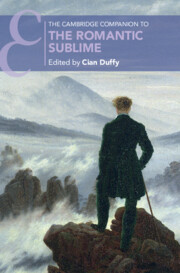Book contents
- The Cambridge Companion to the Romantic Sublime
- The Cambridge Companion to the Romantic Sublime
- Copyright page
- Contents
- Figures
- Contributors
- Abbreviations
- Introduction
- Part I The Sublime before Romanticism
- 1 The Classical Sublime
- 2 The Natural Sublime in the Seventeenth Century
- 3 The Sublime in Eighteenth-Century English, Irish and Scottish Philosophy
- 4 The Nordic Sublime
- Part II Romantic Sublimes
- Part III Legacies
- Further Reading
- Index
- Cambridge Companions To …
2 - The Natural Sublime in the Seventeenth Century
from Part I - The Sublime before Romanticism
Published online by Cambridge University Press: 06 July 2023
- The Cambridge Companion to the Romantic Sublime
- The Cambridge Companion to the Romantic Sublime
- Copyright page
- Contents
- Figures
- Contributors
- Abbreviations
- Introduction
- Part I The Sublime before Romanticism
- 1 The Classical Sublime
- 2 The Natural Sublime in the Seventeenth Century
- 3 The Sublime in Eighteenth-Century English, Irish and Scottish Philosophy
- 4 The Nordic Sublime
- Part II Romantic Sublimes
- Part III Legacies
- Further Reading
- Index
- Cambridge Companions To …
Summary
This chapter considers the early modern ‘prehistory’ of the Romantic sublime. It considers the sublime as a type of experience of the natural world that far preceded its formal articulation, taking as examples the volcanic encounters of the Scottish traveller William Lithgow (c. 1582–c. 1645) and the Jesuit Athanasius Kircher (1602–1680). The natural philosopher Thomas Burnet (c. 1635–1715) has often been identified as an originator of the Romantic sublime; this chapter casts him instead as a lynchpin. He was not the first to ‘see’ the great in nature; instead, his theory challenged the theological foundations of many early modern sublime experiences, paving the way for a theory of the sublime that could move beyond the divine. Above all the chapter argues for the value of the vocabulary of sublime experience to describe encounters with the natural world before the Romantic sublime.
Keywords
- Type
- Chapter
- Information
- The Cambridge Companion to the Romantic Sublime , pp. 29 - 40Publisher: Cambridge University PressPrint publication year: 2023
- 1
- Cited by

